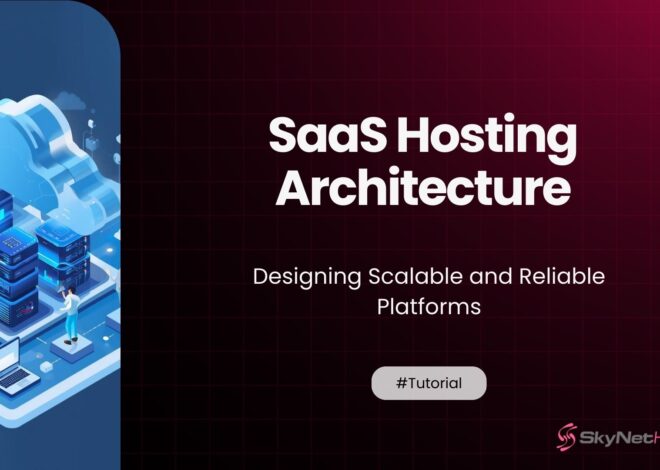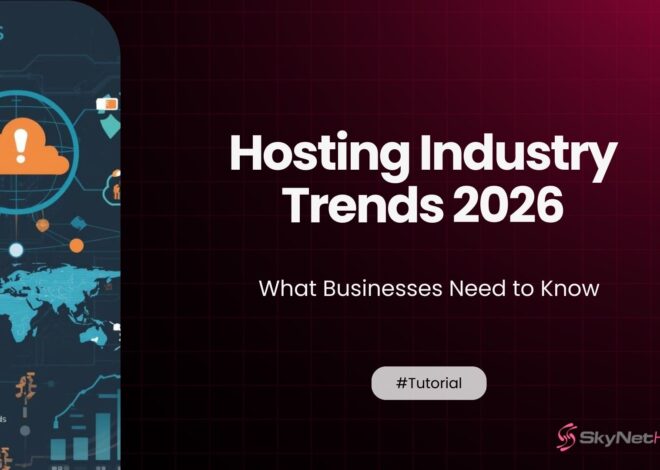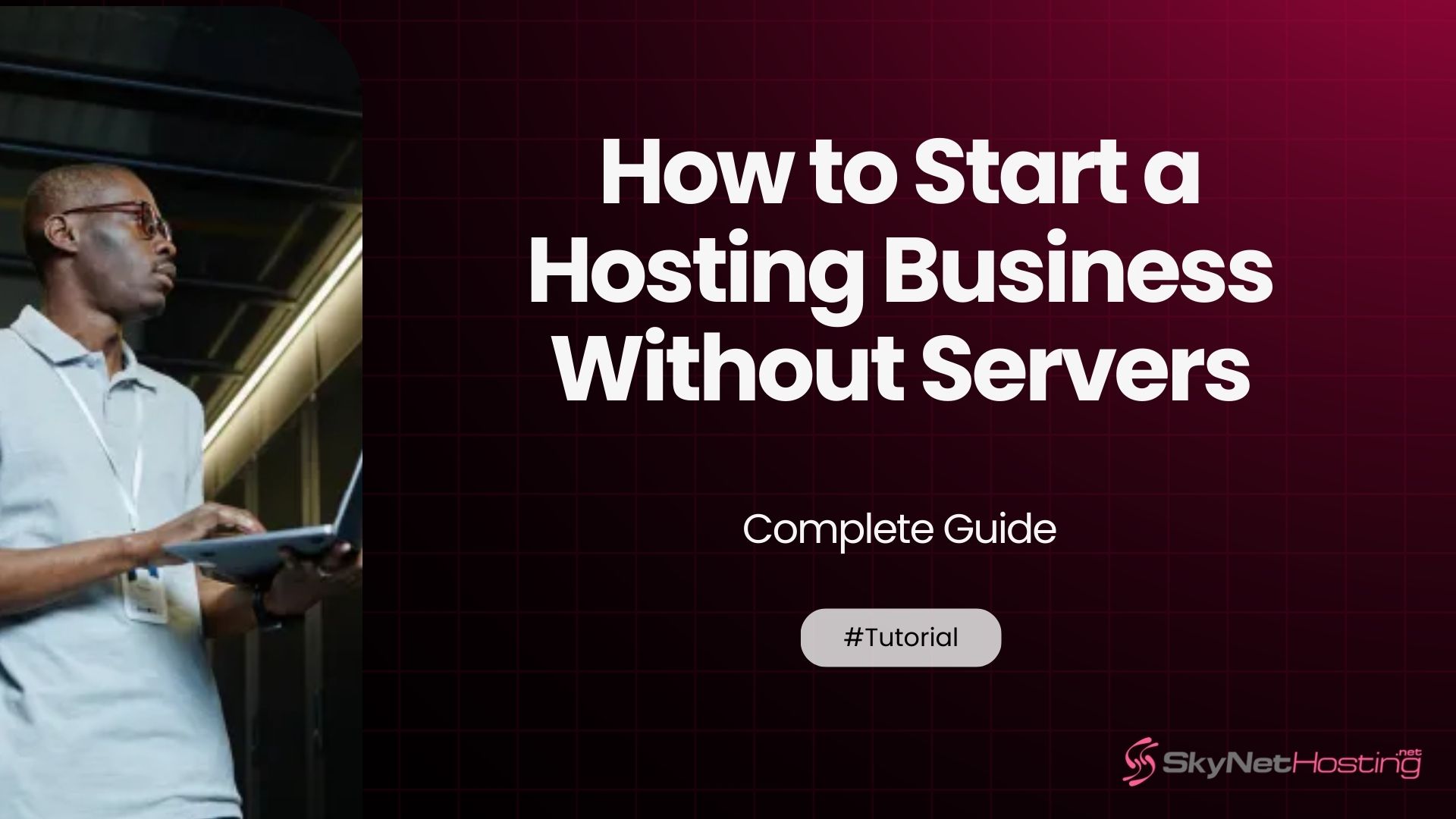
How to Start a Hosting Business Without Servers – Complete Guide
TL;DR
- Starting a hosting business without servers is possible using reseller and white-label hosting, where entrepreneurs sell hosting under their own brand with minimal upfront costs.
- Reseller hosting provides bulk resources and branded control panels, while white-label solutions remove all provider references for a truly brand-owning experience.
- The approach offers low investment, zero hardware management, fast scalability, and automation for billing and provisioning—making it accessible to beginners.
- Key challenges include dependence on provider uptime and support, limited infrastructure control, and the need for strong branding and customer support systems.
- Skynethosting.net stands out for offering free WHMCS, global locations, end-user support, NVMe hosting, and ready-made websites—allowing businesses to launch in under 2 hours.
Starting a hosting business might seem like it requires massive upfront investment. You’d think you need servers, data centers, and technical expertise.
But here’s the truth: you can start a hosting business without owning a single server.
I’ve been in the hosting industry for over 10 years. I’ve seen countless entrepreneurs launch successful hosting companies with minimal investment. The secret? Leveraging existing infrastructure through reseller hosting and white-label solutions.
This guide will show you exactly how to do it. You’ll learn the different approaches, understand the benefits and challenges, and discover how to choose the right provider to get started.
By the end, you’ll have a clear roadmap to launch your own hosting company without the typical barriers to entry.
What Does It Mean to Start a Hosting Business Without Servers?
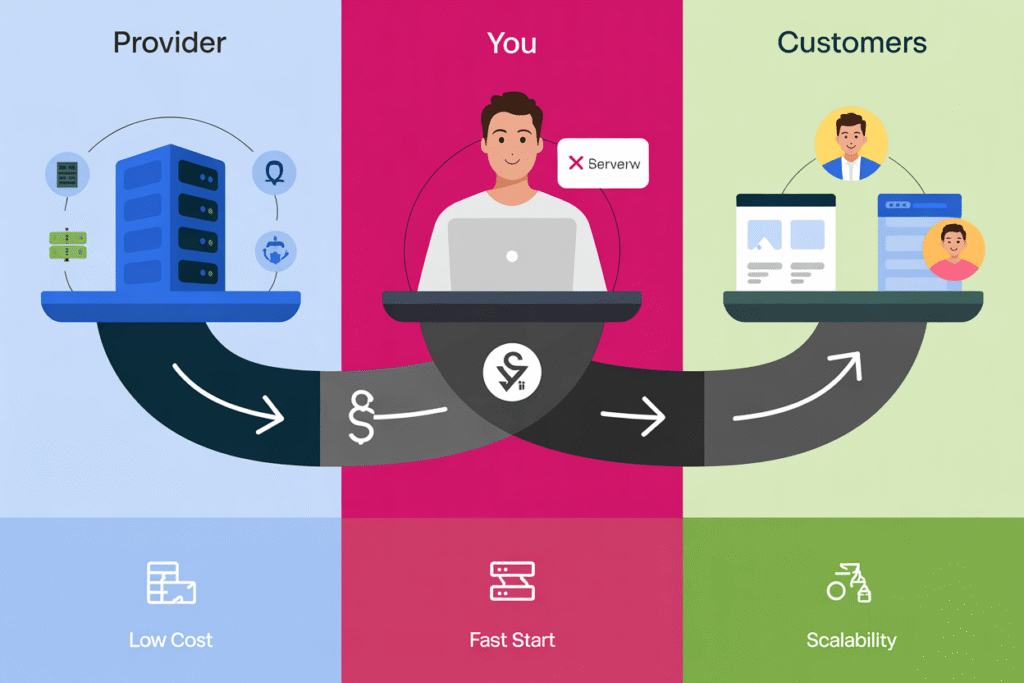
Definition of a Serverless Hosting Business
A serverless hosting business means you sell web hosting services without owning physical servers. Instead, you partner with an established hosting provider who handles all the technical infrastructure.
You become the middleman. You buy hosting resources in bulk from a provider, then resell them to your customers under your own brand.
Think of it like being a retailer. You don’t manufacture products, but you sell them to end customers. The hosting provider handles server maintenance, security updates, and technical support behind the scenes.
Your customers see your brand, your website, and your customer service. They never know you’re using another company’s infrastructure.
Why It’s Popular Among Entrepreneurs
This model has exploded in popularity for good reasons.
First, it removes the biggest barrier to entry: capital investment. You don’t need hundreds of thousands of dollars for servers and data center space.
Second, you can start immediately. No waiting for equipment delivery or setup. You can be selling hosting services within hours of signing up with a provider.
Third, it’s scalable. As your business grows, you simply upgrade your reseller plan or add more resources. No need to buy new hardware or manage capacity planning.
I’ve seen people start hosting businesses from their bedroom and scale to six-figure annual revenues. The low barriers to entry make it accessible to anyone with basic business skills.
How Can You Start a Hosting Business Without Owning Servers?
The Role of Reseller Hosting
Reseller hosting is the most common way to start a hosting business without servers. Here’s how it works:
You purchase a reseller hosting account from an established provider. This gives you a pool of server resources like disk space, bandwidth, and email accounts.
You then divide these resources into smaller hosting packages. For example, if you have 100GB of space, you might create 20 packages with 5GB each.
You set your own prices and sell these packages to customers. The hosting provider handles all server management, but customers interact with your brand.
Most reseller plans include control panel access. You get tools like WHM (Web Host Manager) and WHMCS (Web Host Manager Complete Solution) to create and manage customer accounts. Your customers get cPanel for managing their websites.
The beauty is automation. Once set up, the system runs itself. Customers can sign up, pay, and get instant access to their hosting accounts.
White-Label Hosting Solutions
White-label hosting takes reseller hosting a step further. Everything is completely branded as your company.
With basic reseller hosting, some elements might still show the provider’s branding. White-label solutions remove all traces of the original provider.
This includes custom nameservers, branded control panels, and even support tickets that appear to come from your company.
Some providers offer turnkey hosting platforms. These include a ready-made website, billing system, and support infrastructure. You can literally start a hosting company in minutes.
The downside is higher costs. White-label solutions typically cost more than basic reseller accounts. But the professional appearance can justify premium pricing.
Using Cloud Hosting Platforms
Cloud platforms like AWS, Google Cloud, or SkyNetHosting.Net offer another approach. You can resell their services with markup.
This requires more technical knowledge. You need to understand how to provision servers, configure software, and manage customer deployments.
The advantage is flexibility. You can offer unique configurations and services that aren’t available through traditional reseller hosting.
Many successful hosting companies started this way. They began reselling cloud services, then gradually built their own infrastructure as they grew.
What Are the Benefits of Starting a Hosting Business Without Servers?
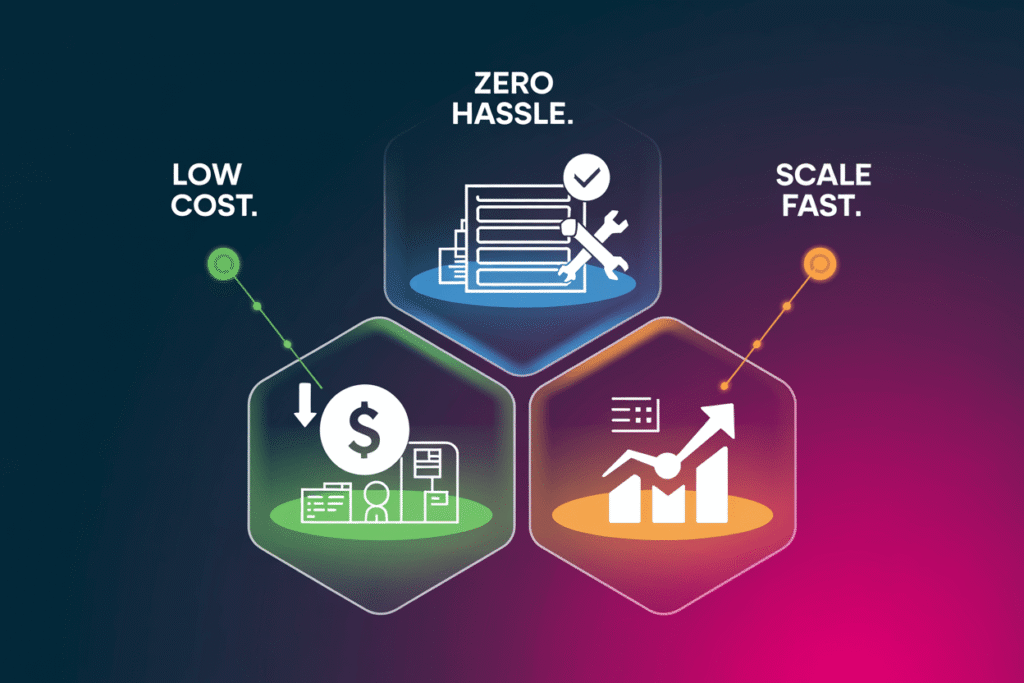
Low Initial Investment
This is the biggest advantage. You can start with as little as $10-50 per month for a basic reseller account.
Compare this to starting with your own servers. You’d need:
- Server hardware: $2,000-10,000+
- Data center space: $200-500/month
- Internet connectivity: $500-2,000/month
- Technical staff: $50,000-100,000/year
- Licenses and software: $1,000-5,000/year
The math is simple. You can test the market and build a customer base without massive upfront costs.
I always recommend starting with reseller hosting. Once you’re generating consistent revenue, you can consider investing in your own infrastructure.
Zero Hardware Maintenance
Server maintenance is complex and time-consuming. Hardware fails, software needs updates, and security patches must be applied constantly.
With reseller hosting, your provider handles all of this. They have teams of experts monitoring servers 24/7. They replace failed hardware and apply security updates automatically.
This frees you to focus on what matters: growing your business. You can spend time on marketing, customer service, and product development instead of server administration.
Even experienced technical people choose reseller hosting for this reason. The operational overhead of managing servers can quickly overwhelm a small business.
Scalability and Flexibility
Growing a hosting business with your own servers requires careful capacity planning. Buy too little, and you’ll run out of resources. Buy too much, and you’ll waste money on unused capacity.
Reseller hosting grows with your business. Need more resources? Upgrade your plan or buy additional accounts. The provider handles capacity planning and hardware procurement.
You can also test different markets easily. Want to offer hosting in Europe? Sign up with a provider that has European data centers. No need to establish your own presence there.
This flexibility extends to services too. Many reseller providers offer add-ons like SSL certificates, domain registration, and email services. You can quickly expand your product lineup without developing new infrastructure.
What Are the Challenges of Running a Hosting Business Without Servers?
Dependence on the Hosting Provider
Your business success depends entirely on your hosting provider’s reliability and performance. If their servers go down, your customers’ websites go down too.
This creates risk. You have no control over uptime or performance. If your provider has issues, you’ll deal with angry customers even though the problem isn’t your fault.
Choose your provider carefully. Look for companies with strong uptime records and good reputations. Don’t just pick the cheapest option.
I recommend having backup plans. Consider using multiple providers or having migration procedures ready if your primary provider fails.
Limited Control Over Infrastructure
You can’t customize the server environment beyond what your provider allows. This limits the types of hosting you can offer.
For example, if a customer needs a specific PHP version or server configuration, you might not be able to accommodate them. Your provider’s standard setup is what you get.
This becomes more problematic as you grow. Larger customers often have specific requirements that standard shared hosting can’t meet.
Eventually, successful reseller hosting businesses migrate to VPS or dedicated servers for more control. But this requires significantly more technical expertise.
Branding and Customer Support Responsibilities
While your provider handles technical issues, you’re responsible for customer relationships. This includes billing, general support, and managing customer expectations.
You need systems for handling payments, managing customer accounts, and providing support. This requires investment in billing software, help desk systems, and potentially support staff.
Many new hosting entrepreneurs underestimate this responsibility. Technical hosting issues are just one part of the business. Customer service, marketing, and business operations require significant time and effort.
How to Choose the Right Provider to Start a Serverless Hosting Business?
Factors to Consider: Uptime, Support, and Pricing
Uptime is critical. Your business reputation depends on keeping customer websites online. Look for providers offering 99.9%+ uptime guarantees backed by service level agreements.
Ask about their infrastructure. Do they use redundant systems? How do they handle hardware failures? What’s their track record during major outages?
Support quality affects your business directly. When customers have issues, you need fast, knowledgeable help from your provider. Test their support before signing up.
Pricing structure matters beyond the monthly cost. Consider:
- Overage charges for bandwidth or storage
- Setup fees and migration costs
- Price increases after promotional periods
- Costs for additional features or services
Don’t just compare headline prices. Calculate total costs including all the features you’ll need.
Why Skynethosting.net Is Ideal for Reseller Hosting
Based on my experience, Skynethosting.net stands out for several reasons.
They’ve been in business for over 20 years, which provides stability and experience. They offer multiple worldwide locations, letting you serve customers globally.
Their reseller plans include valuable add-ons:
- Free WHMCS license (normally $15.95/month)
- Free domain reseller account
- End-user support for your customers
- NVMe storage for faster performance
- Learn other reseller hosting features
The end-user support is particularly valuable. Their technicians handle your customers’ technical questions anonymously, appearing as your support team. This saves you from hiring technical staff immediately.
They also offer ready-made hosting company websites. You can literally start a branded hosting business in under two hours.
Comparing Different Reseller Hosting Options
When evaluating providers, create a comparison matrix. Include factors like:
Technical specs:
- Disk space and bandwidth limits
- Number of accounts allowed
- Control panel options (cPanel/WHM preferred)
- Server locations available
Business features:
- White-label options
- Billing integration
- Marketing materials provided
- Migration assistance
Support and reliability:
- Support response times
- Uptime guarantees
- Backup systems
- Security measures
Don’t rely solely on marketing materials. Read reviews, ask for references, and test their services with a small account before committing to larger plans.
How Do You Launch and Grow a Hosting Business Without Servers?
Building a Website and Branding
Your website is your storefront. It needs to look professional and build trust with potential customers.
Essential pages include:
- Homepage explaining your hosting services
- Pricing and package details
- About page building credibility
- Contact information and support options
- Terms of service and privacy policy
Invest in professional design. Customers compare hosting providers largely on website appearance and professionalism. A cheap-looking website suggests cheap service.
Consider using website builders designed for hosting companies. Many reseller providers offer templates specifically for hosting businesses.
Brand consistency matters. Use the same logos, colors, and messaging across your website, emails, and support materials.
Creating Hosting Packages for Clients
Package design directly affects your profitability and customer satisfaction. Most customers choose middle-tier options, so structure pricing accordingly.
Common package structure:
- Basic: Small websites, limited features
- Professional: Small business sites, more resources
- Business: E-commerce and high-traffic sites
Price packages to encourage upgrades. Make the middle option the obvious best value. Include enough resources that most customers won’t hit limits.
Consider specialized packages:
- WordPress hosting with optimization
- E-commerce hosting with SSL and dedicated IPs
- Developer packages with staging environments
Add-on services boost revenue:
- Domain registration
- SSL certificates
- Website backup services
- Email hosting
- Website building services
Marketing and Customer Acquisition Strategies
Content marketing works well for hosting businesses. Create helpful guides about website building, WordPress optimization, and online business tips.
This builds authority and attracts potential customers through search engines. Many hosting customers research extensively before choosing providers.
Pay-per-click advertising can provide quick results but requires careful management. Target specific keywords like “cheap web hosting” or “WordPress hosting” in your area.
Referral programs encourage existing customers to bring in new business. Offer account credits or cash rewards for successful referrals.
Partnership opportunities include:
- Web design agencies needing hosting for clients
- Digital marketing companies offering full-service solutions
- Local business organizations and chambers of commerce
Social proof is crucial. Collect testimonials, showcase customer websites, and maintain active social media presence.
How Profitable Is a Hosting Business Without Servers?
Revenue Models and Pricing Structures
Hosting businesses typically use recurring subscription models. This creates predictable monthly revenue that compounds as you add customers.
Basic pricing might look like:
- Your cost: $30/month for reseller account supporting 50 customers
- Your pricing: $5-15/month per customer
- Potential revenue: $250-750/month from full utilization
- Gross profit margin: 85-95%
The math improves with scale. Larger reseller accounts have better per-customer economics.
Most successful hosting businesses achieve 60-80% customer retention annually. This means you keep adding to your revenue base rather than constantly replacing churned customers.
Maximizing Profits with Add-On Services
Add-on services significantly boost profitability. Domain registration might cost you $8 and sell for $15. SSL certificates cost $5 and sell for $25-50.
Premium support packages let you charge extra for faster response times or phone support. Many customers gladly pay for peace of mind.
Website services expand your market:
- Website design and development
- SEO optimization services
- Website maintenance and updates
- Content creation services
These services have higher margins than hosting but require different skills. Consider partnering with freelancers or agencies to provide services without hiring full-time staff.
Scaling to a Dedicated Server in the Future
As your business grows, you’ll eventually need more control and resources. This typically happens around 200-500 customers, depending on their usage patterns.
Virtual Private Servers (VPS) provide a middle step. You get more control than shared hosting but don’t need full server management expertise.
Eventually, dedicated servers or cloud infrastructure become cost-effective. At this point, you’re transitioning from reseller to actual hosting provider.
Plan this transition carefully. You’ll need technical staff, monitoring systems, and backup procedures. Many successful hosting companies maintain hybrid models, using their own servers for some services while continuing to resell others.
Building Your Hosting Empire Starts Now
Starting a hosting business without servers isn’t just possible—it’s the smartest way to enter the industry.
You’ve learned how reseller hosting and white-label solutions eliminate the traditional barriers to entry. No massive capital investment, no technical expertise required, and no operational headaches.
The key is choosing the right provider and focusing on what matters: building relationships with customers and growing your brand.
Remember, some of today’s largest hosting companies started exactly this way. They began as resellers, learned the business, and gradually expanded their infrastructure.
Why Skynethosting.net Helps Entrepreneurs Succeed
Skynethosting.net removes the common stumbling blocks that kill hosting startups before they begin.
Their comprehensive reseller packages include everything you need: free WHMCS billing software, domain reselling capabilities, end-user support, and even ready-made hosting company websites.
With 20 years of experience and infrastructure in 25 worldwide locations, they provide the stability and features needed to build a legitimate hosting business.
Most importantly, their end-user support means you can focus on growth while they handle the technical questions that overwhelm new hosting entrepreneurs.
Your hosting business can be operational in less than 97 minutes. The only question is: will you take the first step today?
FAQs
How does reseller or white-label hosting let you start a business without owning servers?
You partner with established providers, repackage their resources under your own brand, and automate client signup and billing without hardware investments.
What are the biggest benefits of serverless hosting entrepreneurship?
Extremely low initial costs, zero maintenance headaches, instant scalability, and rapid market entry with minimal technical skills required.
What are the main challenges of running a reseller hosting business?
Dependence on your provider’s reliability, limited customization, and needing to handle all client relationships, marketing, and billing tasks yourself.
What features make Skynethosting.net ideal for launching a serverless hosting company?
Free WHMCS, global data centers, NVMe SSD storage, end-user technical support, white-labeling, and turnkey business tools for fast, professional launches.
How can serverless hosting businesses maximize profitability and scale?
Bundle add-on services like domains, SSLs, premium support, and web design; structure pricing to encourage upgrades; expand into new markets using the provider’s worldwide presence.

